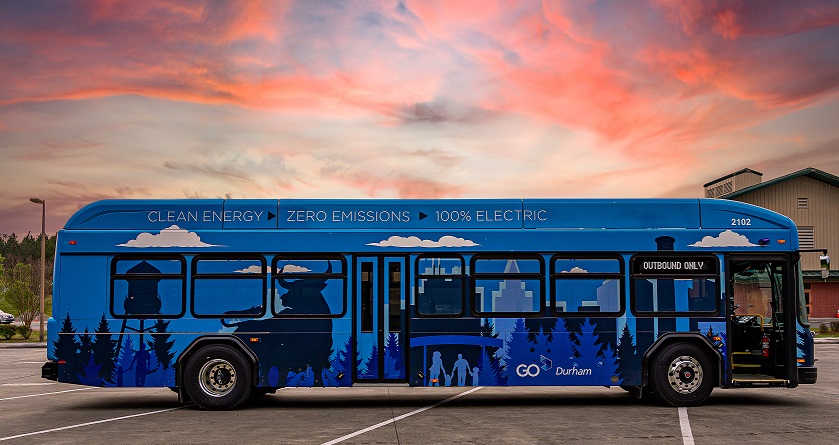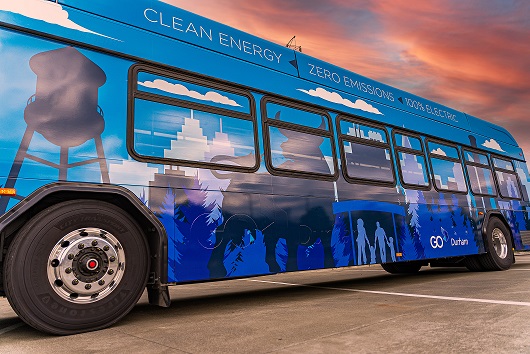
DURHAM (APRIL 19, 2021) – At an Earth Day ceremony Thursday, GoDurham will debut its two new environmentally friendly 100% electric buses, which the agency was able to buy thanks to a federal grant and matching funds provided by Durham taxpayers.
The event will begin at 10 a.m. at the GoDurham facility at 1905 Fay St. in Durham and will include remarks from Durham Mayor Steve Schewel and Durham City Council member Charlie Reece. All media members are invited to attend. The ceremony will include an opportunity to ride an electric bus.
“In our rapidly growing region, these first two electric buses represent GoDurham and the City of Durham’s commitment to a sustainable and greener community,” said U.S. Rep. David E. Price, who represents North Carolina’s 4th District and chairs the House Appropriations Subcommittee on Transportation, Housing and Urban Development. “These state-of-the-art vehicles not only eliminate tailpipe emissions and cut air pollution, but they also help to reduce long-term maintenance costs. In short, it is a win-win investment.”
The Federal Transit Administration’s Low-No Program pays for at least 80% of the cost of the buses and charging stations.
“We want to thank the federal government and the Durham community for helping us bring the first electric buses to Durham,” Mayor Schewel said. “Our great city and county are committed to fostering a greener and healthier community, and adding these first new electric buses that produce no emissions to our GoDurham fleet is an exciting moment for all of us.”

“Investment in clean, quiet, zero-emissions technology aligns with the City of Durham’s strategic goal of having a sustainable natural and built environment,” said Sean Egan, director of the Durham Transportation Department. “This also reflects the input we have received from community engagement to reduce our carbon footprint, improve air quality and reduce noise pollution, particularly for historically disadvantaged communities served by GoDurham.”
The two electric buses join a fleet of 57 GoDurham buses, which carried an average 20,000 passengers a day on 20 routes before the COVID-19 pandemic struck. The electric buses are expected to have a driving range of 150 miles per charge, based on a conservative 2.3 kWh a mile off a six-pack battery with a total of 444 kWh of energy storage.
The FTA’s Low-No Program supports the transition of the nation’s transit fleet to the lowest polluting and most energy efficient transit vehicles. The Low-No Program provides funding to state and local governmental authorities so they can buy or lease zero-emission and low-emission transit buses
Gillig is based in California, where every bus is designed and built.